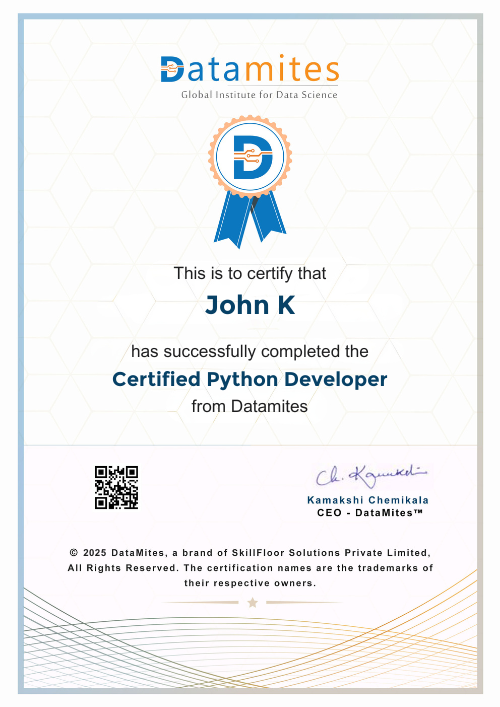Instructor Led Live Online
Self Learning + Live Mentoring
Customize Your Training

• Introduction of python
• Installation of Python and IDE
• Python Variables
• Python basic data types
• Number & Booleans, strings
• Arithmetic Operators
• Comparison Operators
• Assignment Operators
• IF Conditional statement
• IF-ELSE
• NESTED IF
• Python Loops basics
• WHILE Statement
• FOR statements
• BREAK and CONTINUE statements
• Basic data structure in python
• Basics of List
• List: Object, methods
• Tuple: Object, methods
• Sets: Object, methods
• Dictionary: Object, methods
• Functions basics
• Function Parameter passing
• Lambda functions
• Map, reduce, filter functions
• Decorators
• Generators
• Context Managers
• Metaclasses
• Inheritance and Polymorphism
• Encapsulation and Abstraction
• Class methods and static methods
• Special (magic/dunder) methods
• Property decorators - getters, setters, and deletes
• Working with files
• Reading and writing files
• Buffered read and write
• Other file methods
• Logging & Debugger
• Modules and import statements
• SQL Basics
• Creating DB Table
• INSERT, READ, UPDATE, DELETE
• Introduction to MongoDB
• CRUD operations in MongoDB
• namedtuple(), deque, ChainMap,
• Counter, OrderedDict, defaultdict,
• UserDict, UserList, UserString
• Exceptions handling with try-except
• Custom exception handling
• List of general use exception
• Best practice exception handling
• Generators, Iterators
• The Functions any and all
• With Statement
• Data Compression
• A Daytime Server
• Clients and Servers
• The Client and Server Programs
• Classes and Threads
• Multi-threading; thread life cycle
• Regular Expression Syntax
• Group, Split and wildcards
• Quantifiers
• Match, Search and Find all methods
• Character Sequence
• Introduction to OpenCV, Installation
• Basic Operations on Images
• Image Filtering
• Image Classification
• Introduction to GIT
• Basic Git commands
• Introduction to Flask and Installation
• Creating project
• Routing,templates, forms and database integration
• Deployment on render
• Django Introduction and Installation
• Creating a Project
• Django Architecture and File Structure
• Folder Structure, First Django project
• Database and Views, Static Files and Forms
• URL Mapping and Routing
• Defining Models and Relationships
• Database Migrations and Schema Changes
• Querying Data using Django ORM
• Model Forms and Form Validation
• HTML Forms in Django
• Model Forms and Form Validation
• Formsets and Inline Formsets
• File Uploads and Validation
• Deploying Django Applications
• Hosting Options (e.g., Heroku, AWS)
• Project Showcasing and Review
Artificial Intelligence (AI) encapsulates the emulation of human intelligence processes by machines, enabling them to undertake tasks involving reasoning, learning, problem-solving, perception, and decision-making.
AI engineers are chiefly tasked with conceptualizing, developing, and implementing AI algorithms, conducting data analysis, fine-tuning algorithmic performance, and seamlessly integrating AI solutions into existing systems.
AI Research Scientists, Machine Learning Engineers, Data Scientists, AI Architects, and Natural Language Processing Engineers are among the top-paying positions in the AI domain, with remuneration varying based on expertise and geographic location.
Major tech entities such as Google, Amazon, Microsoft, as well as consulting firms like Accenture, are vigorously recruiting AI professionals across various job functions and roles.
In Rome, aspiring AI professionals usually require a degree in computer science or related fields, proficiency in programming languages such as Python, hands-on experience in machine learning, and familiarity with AI frameworks and tools.
AI careers in Rome demand proficiency in programming languages like Python and R, expertise in machine learning algorithms, adeptness with data analysis tools, familiarity with AI frameworks, and robust problem-solving capabilities.
Italian individuals can immerse themselves in AI learning through diverse channels such as online courses, university programs, workshops, and self-directed study via online tutorials and projects.
While not mandatory, certifications can significantly enhance one's prospects in Rome's competitive AI job market, demonstrating competency and proficiency in AI technologies.
AI is fundamentally reshaping various sectors worldwide, including healthcare, finance, transportation, and agriculture, by optimizing processes, driving innovation, and enhancing overall efficiency.
Individuals from diverse professional backgrounds can pivot into AI careers by acquiring relevant skills, undergoing training, and gaining practical experience in the field.
Artificial intelligence drives advancements in e-commerce through personalized recommendations, AI-driven chatbots for customer service, and data-driven pricing strategies, augmenting both customer satisfaction and operational efficiency.
To pursue an AI engineering career in Rome, individuals should focus on obtaining pertinent education, honing programming skills, building a robust portfolio, and staying abreast of the latest AI advancements and technologies.
While offering myriad benefits, artificial intelligence also raises concerns regarding ethical implications, job displacement, privacy infringements, bias in algorithms, and potential misuse, underscoring the necessity for ethical AI development and regulation.
Preparation for AI interviews entails a thorough understanding of core AI concepts, practice in coding and algorithmic problem-solving, review of pertinent algorithms, and showcasing of relevant projects and experiences.
Artificial intelligence finds practical utility across diverse domains, including healthcare, finance, customer service, autonomous vehicles, cybersecurity, and agriculture, among others, catalyzing innovation and optimization.
AI's influence on the entertainment industry is multifaceted, ranging from personalized content recommendations to content creation, predictive analytics, virtual reality experiences, and gaming innovations, enriching user engagement and entertainment offerings.
AI careers typically necessitate degrees in computer science, mathematics, or related fields, supplemented by specialization in AI technologies and methodologies.
Individuals without prior AI experience can embark on an AI career by initiating their learning journey with programming fundamentals, studying AI concepts, engaging with online resources and projects, and seeking mentorship and guidance.
AI applications in agriculture span crop monitoring, yield prediction, soil analysis, pest detection and control, utilization of autonomous machinery, and optimization of supply chain operations, fostering productivity and sustainability in the agricultural sector.
The salary of an Artificial Intelligence in Rome ranges from EUR 34,558 per year according to a Glassdoor report.
Elevating your Python proficiency while in Rome could involve immersing yourself in tailored Python courses, such as those offered by DataMites. These programs cater to individuals at all skill levels, providing hands-on experience and expert guidance to foster growth in Python programming.
Opting for DataMites' Python training in Rome offers numerous advantages. These include globally recognized certifications, distinguished faculty members, a curriculum that stays current with industry trends, and engaging practical projects. Such features ensure a comprehensive and industry-relevant learning experience.
DataMites' Python for Data Science Course in Rome explores various subjects, including data manipulation, analysis, and machine learning using Python. Participants gain practical skills tailored for real-world data scenarios, preparing them for diverse data-centric roles.
DataMites' Python Developer Training in Rome welcomes individuals from all backgrounds, including complete beginners aspiring to become Python Developers. The program offers a structured pathway for those with no prior programming experience to develop market-ready skills.
The Flexi-Pass feature within DataMites' Python training program in Rome offers participants flexibility in choosing between weekday or weekend batches. This flexibility enables effective learning management, accommodating individuals with various scheduling commitments.
DataMites' Certified Python Developer Course in Rome integrates essential Python programming fundamentals with internship opportunities and hands-on projects. Participants gain practical exposure aligned with industry requirements, enhancing their employability.
Yes, DataMites offers Python courses in Rome that include internship opportunities. These internships provide participants with valuable hands-on experience, augmenting their skills and enhancing their prospects in the job market.
DataMites' Data Mining with Python Training in Rome focuses on Python-driven data mining techniques, emphasizing the extraction of insights from extensive datasets. Participants learn to leverage Python for informed decision-making processes.
The Python Developer Course in Rome offered by DataMites spans four months, providing participants with a comprehensive 400 learning hours. This duration allows for in-depth exploration of Python concepts and software development proficiency.
DataMites' Python for Machine Learning Course in Rome introduces participants to various machine learning algorithms, covering both theoretical foundations and practical implementations using Python and the Scikit-Learn package.
DataMites' Python for Deep Learning Course in Rome immerses participants in the realm of deep learning principles using Python. It equips them with the skills to construct and train deep neural networks, leveraging frameworks such as TensorFlow and PyTorch.
Tailored to individual needs, DataMites' career mentoring sessions in Rome provide personalized guidance on various fronts including resume refinement, interview techniques, and strategies for advancing one's career trajectory.
Absolutely. Upon successfully finishing Python Classes in Rome with DataMites, participants are awarded IABAC Certification, validating their proficiency in Python programming.
Yes, attendees must present valid photo identification such as a national ID card or driver's license for Python training sessions in Rome.
DataMites incorporates hands-on projects into its Python Training in Rome, providing participants with invaluable practical experience and opportunities to apply their Python skills in real-world scenarios.
In the event of a missed Python training session in Rome, participants can access recorded sessions and course materials online. Additionally, they can schedule makeup sessions to ensure continuity in their learning journey.
DataMites' Python developer training in Rome integrates a comprehensive suite of tools including Anaconda, Google Colab, Numpy, Pandas, PyCharm, and Flask, facilitating efficient development and analysis processes.
DataMites accepts various payment methods including cash, debit/credit cards, PayPal, and net banking for Python courses in Rome.
The cost of Python training in Rome at DataMites is structured between EUR 146 to EUR 399, ensuring accessibility and catering to participants with diverse budgetary constraints.
Certainly. DataMites offers a demo class for prospective participants in Rome, providing them with a firsthand experience of the teaching methodology before committing to Python Courses.
The DataMites Placement Assistance Team(PAT) facilitates the aspirants in taking all the necessary steps in starting their career in Data Science. Some of the services provided by PAT are: -
The DataMites Placement Assistance Team(PAT) conducts sessions on career mentoring for the aspirants with a view of helping them realize the purpose they have to serve when they step into the corporate world. The students are guided by industry experts about the various possibilities in the Data Science career, this will help the aspirants to draw a clear picture of the career options available. Also, they will be made knowledgeable about the various obstacles they are likely to face as a fresher in the field, and how they can tackle.
No, PAT does not promise a job, but it helps the aspirants to build the required potential needed in landing a career. The aspirants can capitalize on the acquired skills, in the long run, to a successful career in Data Science.



